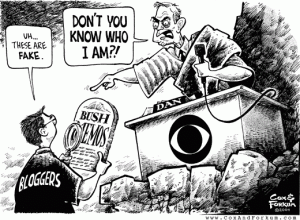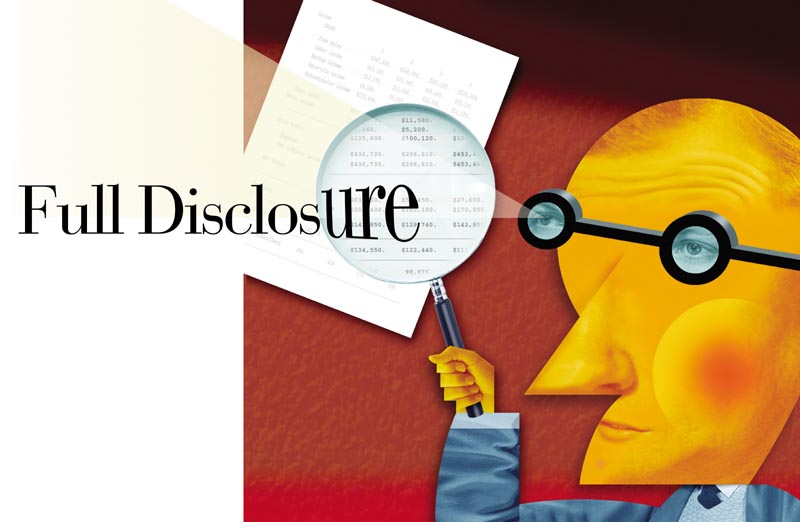Bloggers and Journalism: False Dichotomy
 Stilgherrian has attended one too many Future of Media conferences and he has a long tirade for Old Media journalists whining about bloggers and professional standards.
Stilgherrian has attended one too many Future of Media conferences and he has a long tirade for Old Media journalists whining about bloggers and professional standards.
What’s tiring about this false dichotomy is that it compares the highest ideal of journalism with the lowest grade of personal blogging about what the cat did yesterday and — lo and behold! — they’re not the same. Gosh.
How much everyday journalism actually conforms to the high ideal? Not much. For every Walkley-nominated episode of Four Corners there’s a hundred tawdry yarns about miracle fat cures or shonky builders with a camera shoved in their face. For every investigative scoop there’s a thousand mundane little 5-paragraph yarns that merely quote what someone said at a press conference, and then quote their opponent. Or recycle a media release, putting the journo’s byline where the PR firm’s logo used to be. Or misappropriate statistics to beat up some shock-horror non-existent “crime wave”. Or either fawn or tut-tut over some “celebrity” and their antics — more often than not because that same celebrity is appearing in a TV show or movie that’s completely coincidentally owned by the journalist’s employer.
[…]
The shape of your craft and the form of your stories was determined by the technology used to deliver those stories. Newspapers, for instance, worked to their daily cycles, and stories had the length and structure they did, because of the physical and operational constraints of putting ink onto paper. Some bloke called McLuhan said something about this, ages back — but I wouldn’t know for sure, because I’m not a proper journalist. Still, it strikes me that the very industrial scale of printing a metropolitan daily or producing a 6pm TV bulletin also shapes the way you go about making your stories: all that mechanism between you the journalist and your audience.
[…]
There’s still a role for Real Journalism, of course, with your research and storytelling skills and, yes, with your Code of Ethics too. No-one’s saying there won’t be. And you know what? You too can use all these wonderful new tools to create wonderful new forms of Journalism — if only you’d stop whinging about how your world’s falling apart and actually learn to use them. A hint: You don’t have to wait for your grumpy old chain-smoking editor to show you, either, because he’s a dinosaur and will soon be dead.
I’ve left out most of the good bits of the rant — click the link for entertainment value — but that’s the essence of the argument itself. And he’s right, of course.
The need for professional, full-time journalists isn’t going away. But we no longer need them simply to spread easily-obtained information; there are just too many faster, less filtered ways of doing that nowadays. Nor do we need them anymore as opinion shapers; there are simply too many outstanding pundits out there to read them all, so people can pick and choose based on their interests and tastes.
We do, however, need pros to do longer form journalism. Sure, there are blogs and bloggers who do that (Josh Marshall and TPM are an obvious example) but they’re simply independent professional journalists. The beauty is that this is precisely the kind of work that most journalists worth their salt want to do. The trick now is to persuade their editors, producers, and publishers that letting them do that is the future of their business.
Story via Duncan Riley. Cartoon via Dana Blankenhorn.






“there are just too many faster, less filtered ways of doing that nowadays.”
Is this filtered?
https://www.outsidethebeltway.com/archives/2008/07/afp_iraq_photo_follies/
In short, what’s needed is a little-known thing called ‘the truth’. As an example of how what we’ve been fed isn’t such, I refer you to the graphic as one example.
Not sure I follow?
Clearly, AFP’s filter wasn’t very good on that one.
If you’re saying the blogs overreacted, the correction mechanism was quick and transparent. Within a couple of hours we figured out what the photo actually was and posted that, with links. That’s more than AP or AFP would do, as their habit is to disappear inconvenient errors.
Newspapers do two things: collect and spread information.
The internet has drastically changed who can spread information.
But most bloggers are still highly dependent on newspapers to collect information. I would seriously disagree with your statement that news is easily-obtainable. Serious news requires someone collecting the information, and for the most part bloggers are free-riding on the information newspapers pay to collect.
The long run structural problem if bloggers displace newspapers is who will pay to collect the news. For example, will major bloggers pay to send their own reporters to future war zones as the newspapers have for generations?
That’s mostly true. A lot of what passes for “news,” though, is simply rewriting of wire service copy, press conference stenography, summarizing what happened at campaign events, and the like. Citizen journalists can get that info spread without mainstream reporters.
Going to Iraq and reporting back on what’s going on is absolutely vital. Some of that can and is being done by non-professionals. But, certainly, it’d be hard to get that coverage without full-time pros. But that’s the long form journalism I’m talking about.
One problem with the MSM is their creditability is shot. Their answer to that is to say “trust us†and to bash blogs. I haven’t seen any attempt to clean up their act. Their fact checking has seem to gotten even worst and often don’t even attempt to hide their bias.
Blogs have their faults but they have advantages over standard journalism. Every fact and assumption can quickly and easily be challenge. It is up to the blog system to sort them out. Yes there are idiot bloggers but those usually become quickly apparent. Also it gives those who have knowledge in areas to share their knowledge. Reporters often don’t have a clue what they are talking about.
I think the problem is the MSM has gone too much into the opinion and gossip field. They should leave that to the bloggers and concentrate in the areas that bloggers have a hard time at.
My view has been that where the strength of the bloggers lies, is with analysis of the news, not particularly the reporting of it. Certainly, what the bloggers looking at the fake TANG documents did created news, but how it did that was analysis of what was being reported. This goes to Wayne’s point about creds.
Come to think on it, that has some rather interesting ramifications on why AP went nuts on fair use… They’re reluctant to be judged by bloggers, who use their own words and pictures against them.